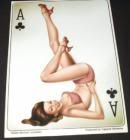On Saturday night, John and I got a little dressed up and went to see
Dance for Life, which is this yearly fundraiser for HIV/Aids charities. It consists of several performances by all of Chicago's major dance studios, including Hubbard Street Dance Chicago, The Joffrey Ballet, Giordano Jazz Ensemble, and my favorite, Thodos Dance. These all comprise the major schools of dance, too, which is great. It's a nice sort of "taster" medley of dance. I've gone for several years now. Dance is one of my favorite performance arts. I especially love really non-narrative stuff. I get a little bored when there's a story trying to be told. I prefer, most times, to just get absorbed in the abstract movements of the dancers.
Saturday night I got to thinking about the spectacle. I was thinking about how, in college, I took a modern dance class and for a while was dating a dancer and how, at one point, I thought that I could've been a dancer. This got me thinking about whether all the other people around me were thinking along similar lines. Since this benefit was pretty pricey, the age bracket was pretty high. I was definitely one of the younger audience members. This all got me thinking about how really
primitive this spectacle is. I mean, though "modern," it's really such a visceral experience to watch dance. Your muscles become taught at the sight of a grown man extending his leg deftly above his head. You feel it in your own toes when a ballerina goes up on hers. The performance, for the first time for me, felt like this sort of vicarious experience of youth and athleticism. When I was younger and watched dance, I felt more like it was a communication - like a two-way conversation, because I felt like the movements I saw were within my ability (maybe with some practice). Saturday, I had the keen feeling that this language was a forgotten one. Not so much alien, just nostalgic.
So, when I say "primitive," I think of it in terms of the old gladiator arenas. The "people" or "masses" watching a few athletic people, usually criminals or destitute individuals (let's face it, dancers don't do it for the money - many of them have two or three jobs to support their passion) and living out this cathartic episode through (in the gladiator's case: violent) acts of athleticism. So, it also had this undertone of bourgeois to me. I've never felt so much a part of some weird elitist group. I dunno. I paid for my tickets and it's for a good cause, so whatever. I just suddenly had gotten really outside of myself and a little self-conscious.
In the end, the experience was awe-inspiring. I still love dance and would like to see it more frequently. It's usually not very expensive. Chicago has a great community of dancers as well. It's the art form that I feel is most like music, which is most like abstraction, which is most like Divinity, which is pretty cool.


